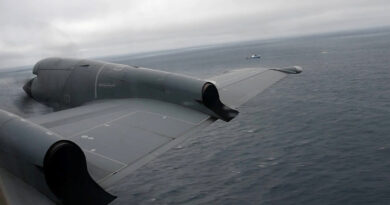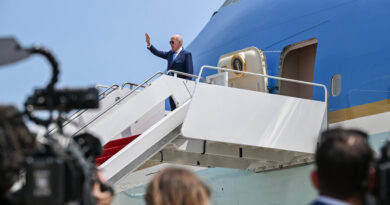Wagner Says It Is Leaving Bakhmut, Posing Challenge for Russia
[ad_1]
Days after declaring victory in Bakhmut, the Wagner private military company said Thursday that it was turning the Ukrainian city over to the Russian Army, which must now try to hold on to it without the help of the brutal mercenary force on which it has grown dependent.
Wagner’s leader, Yevgeny V. Prigozhin, suggested that Russia’s regular soldiers can expect no more help from the group — at least, not in Bakhmut. In a three-minute video, Mr. Prigozhin is shown visiting what he says are Wagner positions in the city and telling his fighters to hand them over to Russian troops.
“Leave them soap, but take away your toothbrushes,” he says.
A Wagner withdrawal could open a new phase of the monthslong struggle for Bakhmut, testing whether the Russian Army can hold the hard-won ground against Ukrainian forces that have advanced on the city’s outskirts and are preparing to launch a broader counteroffensive.
“Now the Russian General Staff will have to find enough reserves to fill the resulting gap,” Dmitri Kuznets, a military analyst for Meduza, a Russian news website, said in response to written questions. “This is in addition to fending off the Ukrainian offensive, which will also require a significant number of reserves.”
Ukraine has conceded that despite the firepower it devoted to hold Bakhmut, where tens of thousands are believed to have died, Russia now controls nearly the entire city. It says its forces are shifting their focus to make it difficult for Russia to hold Bakhmut or to move deeper into eastern Ukraine.
On Thursday, a deputy Ukrainian defense minister, Hanna Maliar, said that Ukrainian troops controlled an area just southwest of Bakhmut and that they were trying to make further gains on the outskirts.
“In the Bakhmut direction, the enemy is trying to stop our advance on the flanks with artillery fire,” Ms. Maliar said. “Now the enemy is pulling up additional units to the flanks for reinforcement.”
Regular Russian Army units have replaced Wagner fighters in Bakhmut’s suburbs, she said, while Wagner forces remained inside the city.
The repositioning around the city came as Russia and Ukraine engaged in dueling drone battles on Thursday.
Ukraine’s military said that it shot down dozens of Russian drones aimed at targets across the country before dawn, while Russian officials said they had thwarted an attack by Ukrainian aerial and maritime drones taking aim at the home of the Russian Black Sea Fleet in Sevastopol, Crimea.
Even as its forces have reinforced a maze of fortified defensive positions across hundreds of miles of farmland, fields and river banks in recent weeks, Moscow has also stepped up aerial bombardments to try to disrupt Ukrainian military preparations for a counteroffensive, according to Ukrainian officials and military analysts.
Ukraine has spent weeks targeting key Russian command and control centers, rail lines, air fields and other military installations across occupied territories with the apparent aim of limiting Moscow’s ability to move troops and equipment quickly and effectively.
Mykhailo Podolyak, a senior adviser to President Volodymyr Zelensky, said Thursday that recent military actions were all part of the Ukrainian counteroffensive, which he said would not be marked by a “single event.”
There are “dozens of different actions,” Mr. Podolyak said in a post on Twitter, aimed at destroying the “occupation forces in different directions, which have already been taking place yesterday, are taking place today and will continue tomorrow.”
“Intensive destruction of enemy logistics is also a counteroffensive,” he said.
Vadym Skibitsky, Ukraine’s deputy intelligence chief, said that disrupting Russian military movement in Crimea was essential to the Ukrainian campaign. “Their reinforcements and the redeployment of troops, the supply of ammunition and equipment in the occupied territories all go through Crimea,” he told the German publication Welt in an interview published on Thursday.
Crimea holds enormous symbolic and military value for the government of President Vladimir V. Putin, who seized the peninsula in 2014 and has described it as a centerpiece of what he sees as Russia’s national restoration.
On Thursday, the Kremlin-installed governor of Crimea said that multiple Ukrainian drone attacks had been thwarted across the territory. And the Russian-appointed governor of the Crimean port of Sevastopol said that two aerial drones had been shot down with small arms and that several maritime drones had been disabled using electronic warfare tools that jammed their signals.
The claims could not be independently verified.
The capture of Bakhmut has given Moscow a rare and very costly victory, and made clear how reliant it has become on the Wagner forces and their outspoken leader, who has been scathingly critical of the Russian military.
For many supporters of Russia’s invasion of Ukraine, the Wagner group, with its harsh discipline and agile decision-making, has become a model for what the Russian Army, plagued by cumbersome bureaucracy, should look like.
In recent days, buoyed by victory in Bakhmut, Mr. Prigozhin has become still more outspoken, warning Russian elites that they face the prospect of a popular uprising if they do not put the country on a real wartime footing.
But for all the infighting, Wagner and the Russian Army are also dependent on each other. While Mr. Prigozhin has some of the best assault troops fighting on the Russian side, the Defense Ministry holds vastly larger weapons supplies — much to Mr. Prigozhin’s recent frustration.
While the Russian military leadership might prefer not to rely on Wagner for help again, said Mr. Kuznets, the military analyst, Moscow’s lack of sufficient troops makes the mercenaries’ eventual redeployment in Ukraine “inevitable.”
In Bakhmut on Thursday, Mr. Prigozhin signaled that Wagner’s pullout would take several days.
“We will get rest and get ready,” he said in the latest video. “And then we will receive a new task.”
[ad_2]
Source link



